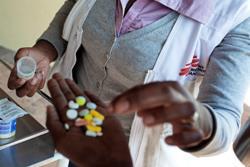Illness risk for poor who pick food off dumpsites

 “I have been compromising my health just to feed them. I can’t bear to see my family without food. Some days go by without any food. In 2010 I contracted severe diarrhea, which got me admitted to Carolina Hospital from the food I got from this dumping side, I ate food which was contaminated with e-coli, which is a bacteria found from human waste. ’’
“I have been compromising my health just to feed them. I can’t bear to see my family without food. Some days go by without any food. In 2010 I contracted severe diarrhea, which got me admitted to Carolina Hospital from the food I got from this dumping side, I ate food which was contaminated with e-coli, which is a bacteria found from human waste. ’’
According to *Sibongile Khoza from Chief Albert Luthuli municipality: “We understand our district has a high unemployment rate but it is dangerous for anyone to be in the waste dumping site. We have been pleading with them several times to stop going to the dumping site but unfortunately they still continue going in every day.”
Minisi said: “Hygiene is very important but I rather compromised my health as long as I provide food for my family. I trying by all means to wash and clean the food but we can’t clean all the germs off.”
Sister Marciaous Simelani from Caroline Hospital said: “My advice to Miss Mnisi and her co-workers is to stop working in the dumping site. I understand providing for their families is important. The place is dangerous and they are putting their health in danger.
“It’s important that they cover their mouth with a mask to protect themselves from the TB bacteria and other airborne bacteria. Bacteria are easier to spread when a person coughs or sneezes and the risk of contracting TB is high. The dumping site environment is a breeding ground for bacteria.”
Author
Republish this article
This work is licensed under a Creative Commons Attribution-NoDerivatives 4.0 International License.
Unless otherwise noted, you can republish our articles for free under a Creative Commons license. Here’s what you need to know:
You have to credit Health-e News. In the byline, we prefer “Author Name, Publication.” At the top of the text of your story, include a line that reads: “This story was originally published by Health-e News.” You must link the word “Health-e News” to the original URL of the story.
You must include all of the links from our story, including our newsletter sign up link.
If you use canonical metadata, please use the Health-e News URL. For more information about canonical metadata, click here.
You can’t edit our material, except to reflect relative changes in time, location and editorial style. (For example, “yesterday” can be changed to “last week”)
You have no rights to sell, license, syndicate, or otherwise represent yourself as the authorized owner of our material to any third parties. This means that you cannot actively publish or submit our work for syndication to third party platforms or apps like Apple News or Google News. Health-e News understands that publishers cannot fully control when certain third parties automatically summarise or crawl content from publishers’ own sites.
You can’t republish our material wholesale, or automatically; you need to select stories to be republished individually.
If you share republished stories on social media, we’d appreciate being tagged in your posts. You can find us on Twitter @HealthENews, Instagram @healthenews, and Facebook Health-e News Service.
You can grab HTML code for our stories easily. Click on the Creative Commons logo on our stories. You’ll find it with the other share buttons.
If you have any other questions, contact info@health-e.org.za.
Illness risk for poor who pick food off dumpsites
by cynthiamaseko, Health-e News
August 8, 2013



